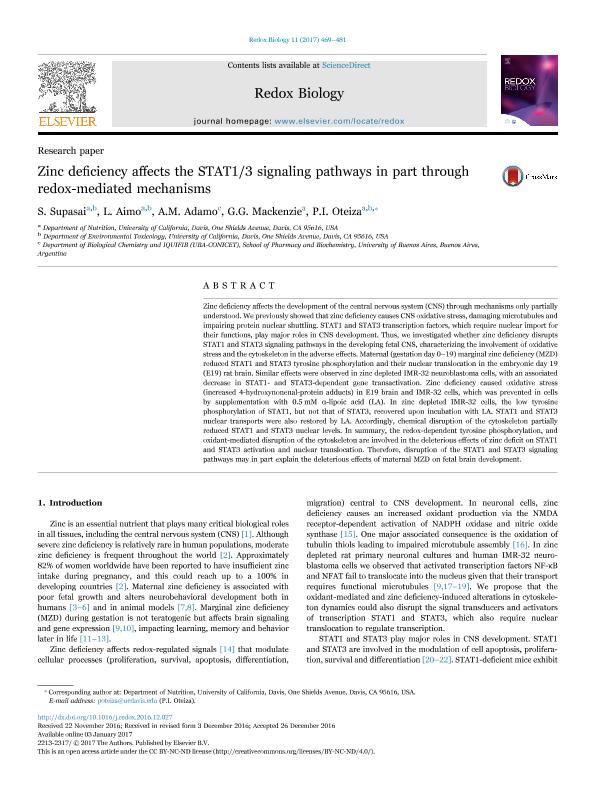Artículo
Zinc deficiency affects the STAT1/3 signaling pathways in part through redox-mediated mechanisms
Fecha de publicación:
04/2017
Editorial:
Elsevier
Revista:
Redox Biology
ISSN:
2213-2317
Idioma:
Inglés
Tipo de recurso:
Artículo publicado
Clasificación temática:
Resumen
Zinc deficiency affects the development of the central nervous system (CNS) through mechanisms only partially understood. We previously showed that zinc deficiency causes CNS oxidative stress, damaging microtubules and impairing protein nuclear shuttling. STAT1 and STAT3 transcription factors, which require nuclear import for their functions, play major roles in CNS development. Thus, we investigated whether zinc deficiency disrupts STAT1 and STAT3 signaling pathways in the developing fetal CNS, characterizing the involvement of oxidative stress and the cytoskeleton in the adverse effects. Maternal (gestation day 0?19) marginal zinc deficiency (MZD) reduced STAT1 and STAT3 tyrosine phosphorylation and their nuclear translocation in the embryonic day 19(E19) rat brain. Similar effects were observed in zinc depleted IMR-32 neuroblastoma cells, with an associated decrease in STAT1- and STAT3-dependent gene transactivation. Zinc deficiency caused oxidative stress (increased 4-hydroxynonenal-protein adducts) in E19 brain and IMR-32 cells, which was prevented in cells by supplementation with 0.5 mM α-lipoic acid (LA). In zinc depleted IMR-32 cells, the low tyrosine phosphorylation of STAT1, but not that of STAT3, recovered upon incubation with LA. STAT1 and STAT3 nuclear transports were also restored by LA. Accordingly, chemical disruption of the cytoskeleton partially reduced STAT1 and STAT3 nuclear levels. In summary, the redox-dependent tyrosine phosphorylation, and oxidant-mediated disruption of the cytoskeleton are involved in the deleterious effects of zinc deficit on STAT1and STAT3 activation and nuclear translocation. Therefore, disruption of the STAT1 and STAT3 signaling pathways may in part explain the deleterious effects of maternal MZD on fetal brain development.
Palabras clave:
Zinc Deficiency
,
Stat1/3
,
Oxidative Stress
Archivos asociados
Licencia
Identificadores
Colecciones
Articulos(IQUIFIB)
Articulos de INST.DE QUIMICA Y FISICO-QUIMICA BIOLOGICAS "PROF. ALEJANDRO C. PALADINI"
Articulos de INST.DE QUIMICA Y FISICO-QUIMICA BIOLOGICAS "PROF. ALEJANDRO C. PALADINI"
Citación
Supasai, S.; Aimo, L.; Adamo, Ana María; Mackenzie, Gerardo G.; Oteiza, Patricia Isabel; Zinc deficiency affects the STAT1/3 signaling pathways in part through redox-mediated mechanisms; Elsevier; Redox Biology; 11; 4-2017; 469-481
Compartir
Altmétricas




